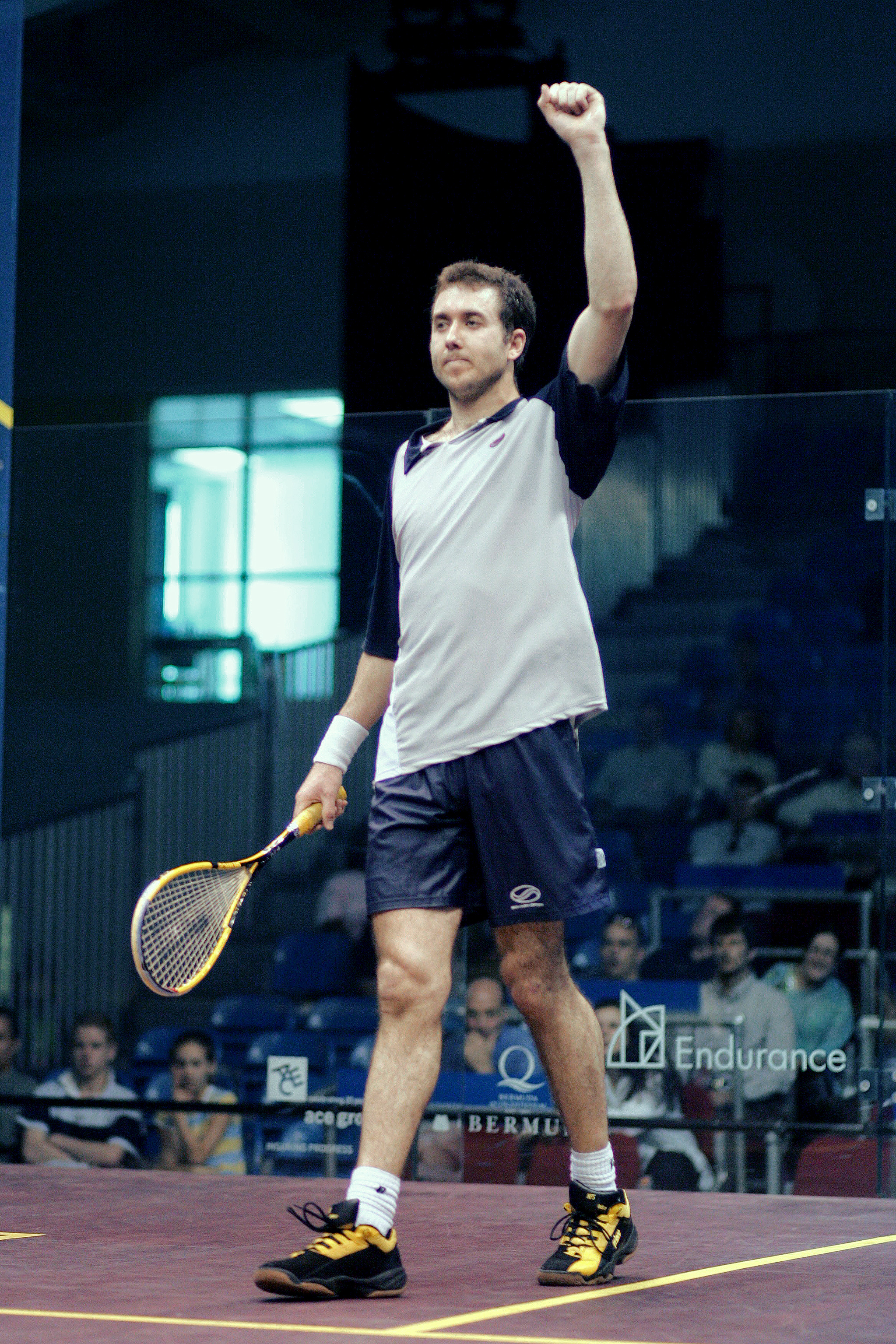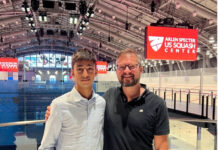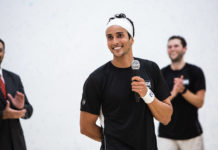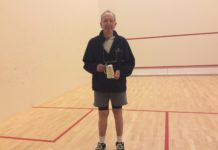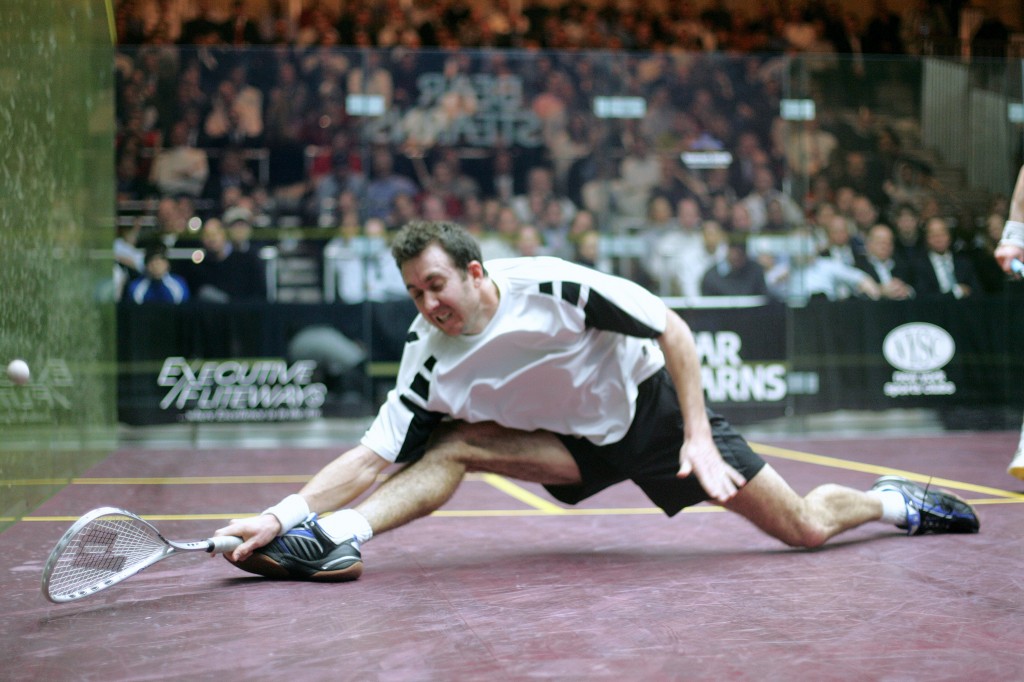
By James Willlstrop, PSA No. 12
Photos by Steve Line/SquashPics.com
Anyone who has been lucky enough to witness John White hit a squash ball will have been thrilled to see a technique and execution of shot that no other player has ever been able to replicate. He is a unique squash player, an outrageous talent with an infectious character. He can hit the ball at an unholy speed of 172 mph. No one dislikes John. Highly affable and naturally sociable, he’s as laid back as a person gets, and appears to be someone who would never think too much, or too deeply. This characteristic showed in the nature of his game. He never became too intense and he rather just let it happen—he acted on impulse. You can’t possibly imagine him ever sitting down to work out a game plan. It would be pointless. The game he played was too different, and his talent couldn’t have flourished had it been put under constraints. On tour, he was one of those players who all the other players would want to watch, and also one they would very happily share a beer with.
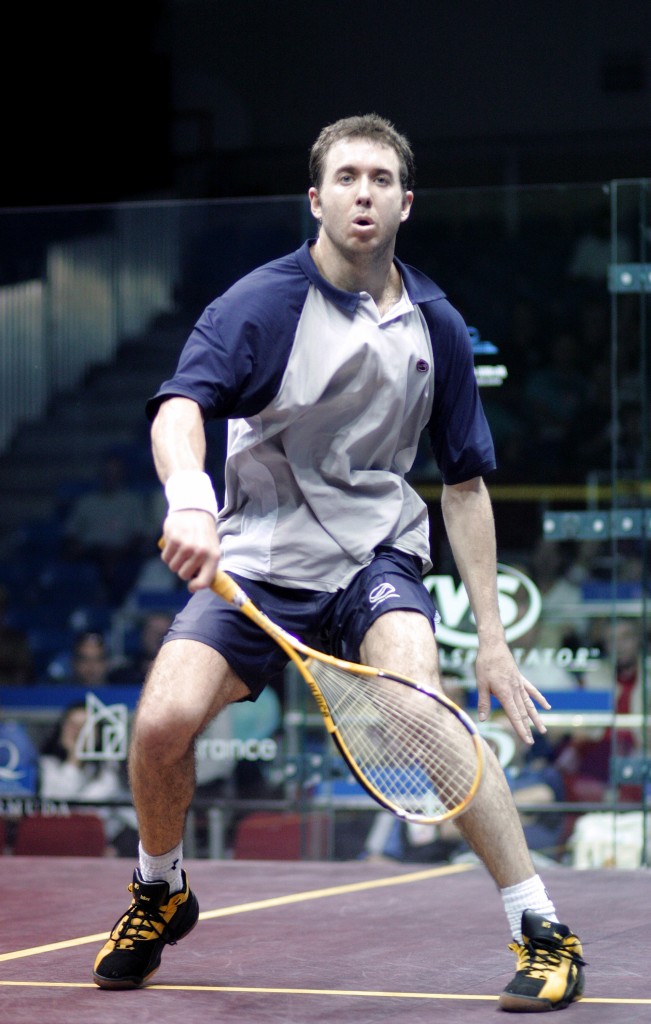
It could be said that he was a late developer. At 26 he had been playing the tour for six years, and wasn’t making much headway in the world rankings. At the time it looked like he might not fulfill the talent that he so obviously had.
A semifinal, however, at the US Open in 1999 took him into the top-10 in the world for the first time. Two years of minor fluctuating and he was in the top four, after four semifinals, one final and a career-changing win at the ESSO Flanders Open in February 2001. His victims there were Marshall, Lincou, Beachill, Nicol and Price. Two matches went to five and, looking back at the scores, White was winning games 17-16. Maybe he now had the legs and the lung capacity to match the talent. One thing was clear at this point: he had gained that all-important confidence and the next year he reached three major finals. Nicol and Palmer seemed to be one step ahead of him at this point, eluding the Great White the titles, none more desperate than the World Open in 2002, and those match balls.
He was moving quickly forward, though, and was embarking on his richest spell as a professional. Two finals and two major wins during the course of 2003 helped him to attain the holy grail of the PSA; that number 1 spot, and his finest achievement. There was plenty to come from him and he maintained a top-12 ranking for 75 consecutive months from January 2002 to April 2008. It was easy for people to write him off too quickly but he managed to beat the World’s best for a long time, notching wins over Karim Darwish, Gregory Gaultier and Thierry Lincou in 2007.
And so after 16 years of traveling and playing, in October at the World Open, he decided to call it a day. He played one more match at the Tournament of Champions in 2009, which irks him slightly and causes a slight pang of regret. He is now settled in the US, where he is the Director of Squash at Franklin & Marshall College in Lancaster (PA) and with four children to take care of, he clearly felt the time was right to start being responsible.
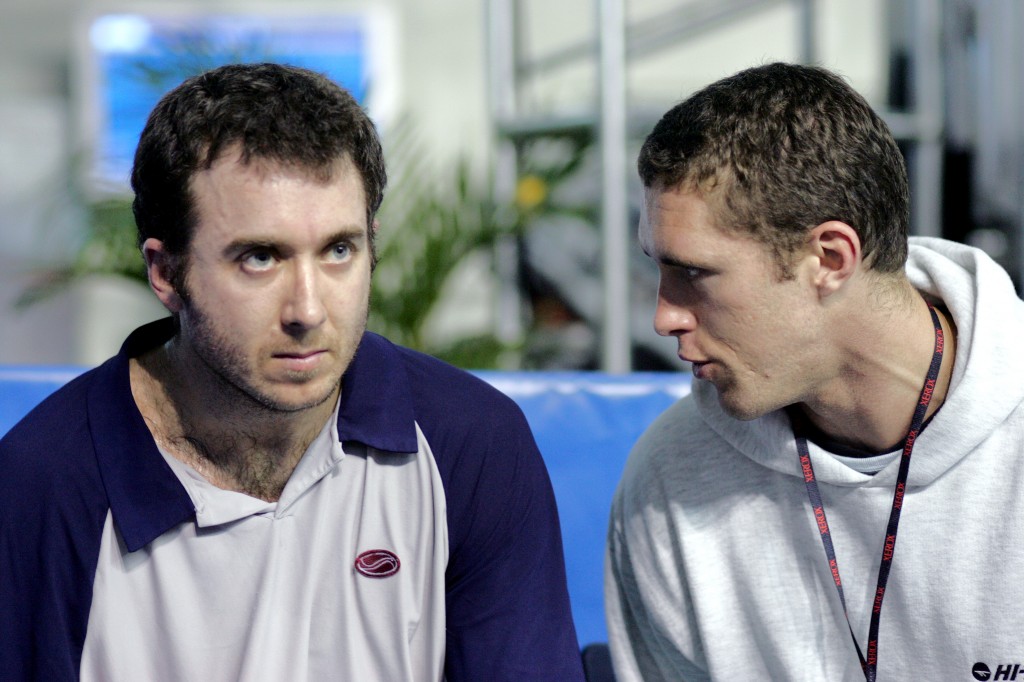
Tell us about the decision to retire. Was it difficult, and are you happy with the timing? Or was it just because you played me at the worlds and wanted to end on a good note!?
The retirement was a very hard decision as I had a great time traveling, and I loved playing all over the world. I was thinking about not playing the worlds and just calling it quits before getting there as I had not been doing much training at all. To tell you the truth it was only on our last point at the worlds, I was standing in the middle of the court looking at the floor when I said to myself that that was it. I’d had enough. You came over and shook hands and that is when I said it for the first time to someone else. I had not even talked to Ellery about the decision. When I walked to my corner after the match I sat down with tears in my eyes and told Ellery it was over! (Ed. Note: Ellery Hanley is a rugby legend in the UK and a good friend of White’s)
I shouldn’t have played TOC this year! I wanted to play one more time in front of the New York crowd and on that court as I have had so many great matches there.
I presume your wife Susie, and your family are happy with it?
My family are very happy. I get to see the kids a lot more and I take them to their weekend games and see them get on the big yellow bus in the mornings. It’s a real family life now! Susie and the kids were a huge support from home when I was away and they made it easy for me to travel and be away when needed.
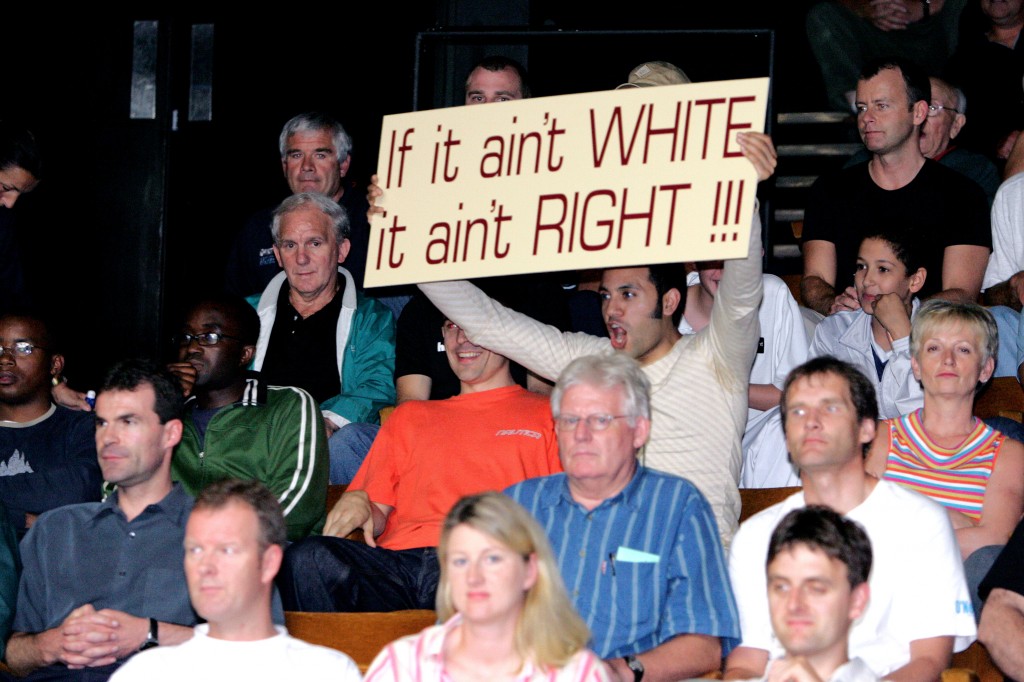 How’s the new job?
How’s the new job?
College coaching is a blast at Franklin and Marshall. I set the programs both on and off the court, recruit, and schedule their away matches and I travel with the teams.
John’s retirement is a mighty shame for Squash; his ability to perpetually fire up a crowd and utterly dazzle them with his brand of squash did massive amounts for the game and he always pulled in a crowd, wherever he went.
My very first encountering of John was when he paid a visit to my club (Pontefract, in England), with David Palmer, to train there. My Dad, Malcolm is always happy to tell the story of when, after one training session, he told them they were both hackers and that they would be better off finding another game. Some years later he glanced at the ranking list and they were both in the top four in the world, making a mockery of that piece of judgement.
John’s outbursts, stern faced comments, and his trademark crack on the calf having played a bad shot could be half intimidating, half hilarious. A British Open match he played against Rodney Eyles in Birmingham almost gave me nightmares as a 15-year-old. Watching the Great White hurl his racket in to his corner in disgust and berate the referee could have almost been x-rated, but this was completely against the nature of the man I came to be familiar with.
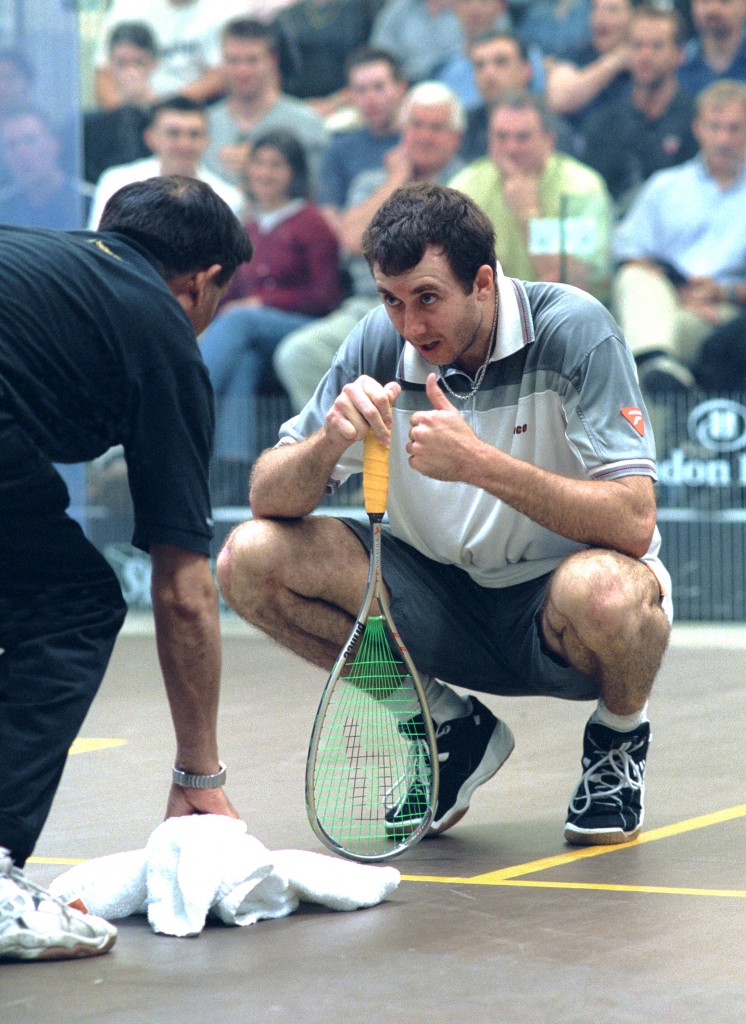
Can you take us back? What got you in to squash?
I first got started in squash through my mum and dad. They played on a regular basis and mum also worked at a squash club. We would be there after school and on weekends as court rats. As soon as the adults opened the door and came off we would get on the court and hit around. I loved the game from day one.
Can you describe your first years as a pro, when you were based in Europe? How did that go? Who did you train with?
My first years as a pro were spent in Switzerland with Reto Donatch and his family. I was there for about three or four months. I trained with the locals and played a bunch of small events around Europe.
Then the big breakthrough came at the ESSO open in Belgium where you beat the world’s best in your first Super Series win? Was that a surprise or were you ready?
The breakthrough at Esso came after a four or five month lay-off from the game. I was based in Belgium at the time and was training on my own and doing a few lessons at a club. Before Belgium I was back in Australia working at a Liquor store. I Was not playing any squash, just riding to and from work, stopping by a few pubs on the way home to get over a hard day at work!! While back in Belgium I got the bug back for squash and decided to have another go at it. I was so relaxed at the event as I really had nothing to lose. My fitness was great and I remember hitting the ball pretty well! It all fell into place at that event.
So the idea is to get to the pub, and play less? The readers will be pleased to hear this. Were you coached?
Coach?? No coach could handle me…not even the famous Sir Malcolm Willstrop!! He still owes me a hug, we will get to that a little later.
Who, then, were your biggest influences?
Biggest influences were mum and dad. They helped me from start to finish always sending me in the right direction and letting me know they always supported what I did or where I went.
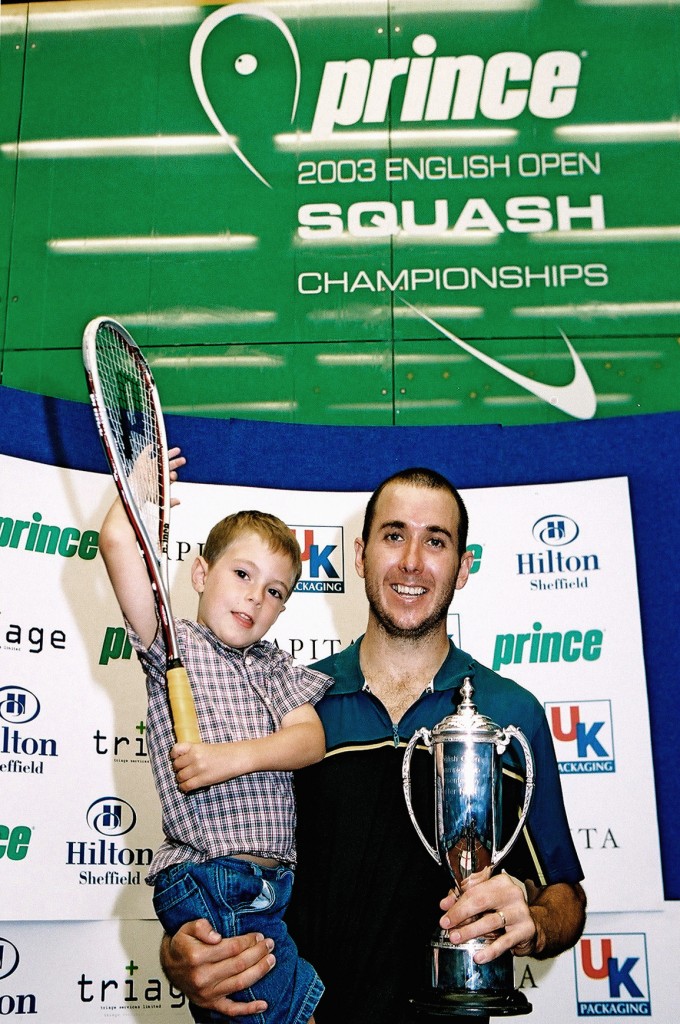
And you moved to Nottingham?
The move to Nottingham was to get better training partners as it was drying out over in Europe.
How was your training?
Vaughan Williams had a big impact on my career at that time. Training was very hard but most of all I enjoyed doing the work that was set out by Vaughan. Before going full time with him we had a trial run at the Nottingham Uni. That was the start of a great relationship. Best of all during training was that Vaughan would do most of the exercises with me. I have to say it was pretty close but I think I got the best of him every session! Luv ya Vaughan. (Ed. Note: Vaughan Williams is the Director of the Nottingham University Sports Centre)
What about the Australian institute? Did you have a relationship with them? I know you were close with Joe Shaw.
The AIS were great. If it was not for the support and funding to go overseas I could not have done what I did. I thank them and I always will. And Joe Shaw? I am still in contact with that Crazy Old Man. (Ed. Note: Joe Shaw has coached White, Palmer and others to world prominence.)
2003 was a big year wasn’t it? You were on a roll, and it took you all the way to the top spot. How were you feeling by then?
2003 was a great year. All the work that Vaughan and I had done was paying off. I was very happy with my fitness and speed. Everything felt good which is the key to playing well. I did not mind having the long rallies if needed and I didn’t mind who I played. It was a great feeling to have things just fall into place.
John produced some of his best and most entertaining performances in the last part of his career. At the Canary Wharf Classic in 2007, I remember preparing for my semifinal watching him play Thierry Lincou, and I was in and out of the press room to check the score. No one would have dismissed John’s chances but Thierry was a clear favorite. Warming up, I could see that it was becoming one of those matches it would be wrong to miss, and as the game went in to a fifth, the group of players, media and officials in the room dropped what they were doing and became transfixed at what was happening. At 7-2 to Thierry everyone thought it was over, but slowly John fought back, leveled and somehow managed to win. It was one of those matches where my own match became a secondary thought because I had to watch; the rallies were phenomenal; John’s ready-to-drop retrieving outrageous. This was all good enough, but the shot that followed, a forehand volley crosscourt nick was one of the best shots anyone can ever hope to see. John White pushed himself to the limit that night, and quite honestly I was very happy to be playing him less than 24 hours later, after the sheer physicality of the match.
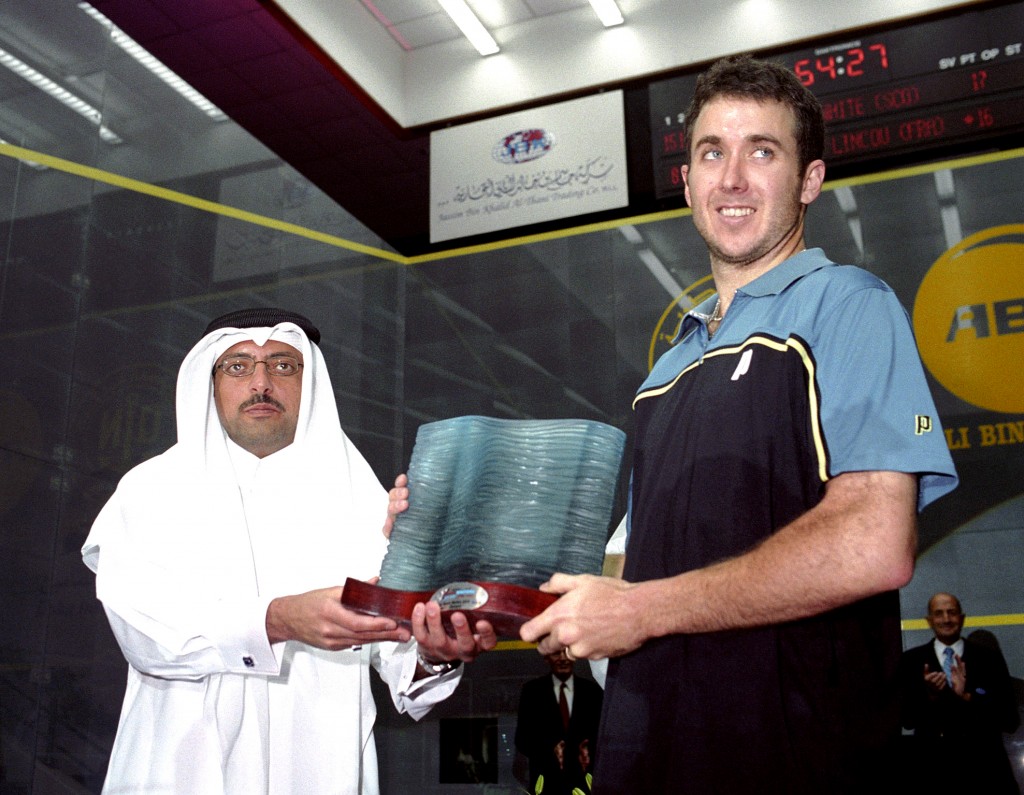
However, unfortunately for me, John came out a new man in the final, like a greyhound out of the traps, and to be quite honest I didn’t know where he would send me next. I was outplayed for the best part of four games until he eventually ran out of steam.
The following February in New York, he nearly repeated the Lincou performance, taking Gaultier to five in another unforgettable match. The fourth game John put together was mind blowing, and he again unleashed his crosscourt nick, the crowd standing to give one enormous crescendo of applause that shook the chandeliers at Grand Central. Again I was warming up, and again I was mesmerized. Very few times in my career have I bothered to applaud or watch a player 20 minutes before I am due to play.
You had some incredible matches in the last few years. Do you remember that shot you hit against Thierry at Canary Wharf? And the effort against Gaultier at TOC in 2008? You gave a lot of enjoyment to those crowds.
Playing in front of the crowds at TOC and Canary Wharf is what makes squash very enjoyable to play at the top. Those matches are the best, as the crowd is cheering after every rally and you try even harder as you do not want to let them down. The crosscourt nick to win the match against Thierry in the semis you mean? Great shot hey, and at the right time!!
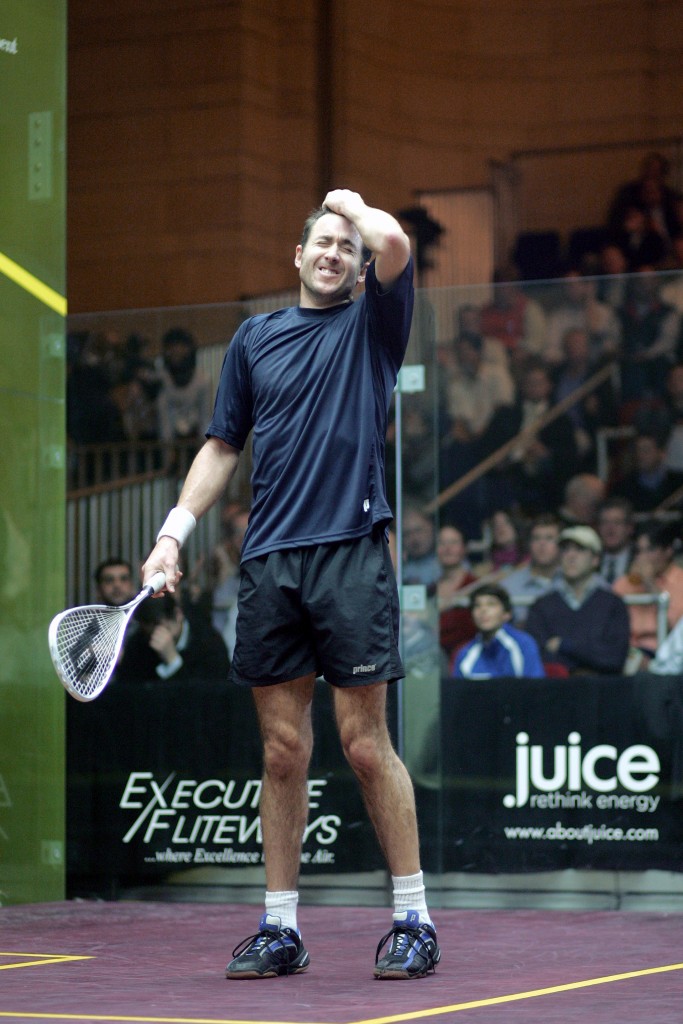
But of course you ll also be remembered as the guy who can hit the ball 172 mph. You must be sick of hearing that. But John, tell us, how do you hit it so hard?
172MPH. I will never get sick of hearing that mate. It is pretty easy to do—relax the arm, drop the shoulder and elbow in, roll the forearm and flick the wrist to bring the racquet head through as quickly as possible. That’s $50 mate. Let me know if you need any other help with your game?
Thanks John, I don’t need it ruining anymore than it already is though thanks. Do you have future plans?
Plans at this time are to stay in the States but there is more to come on this.
Who were your favorite players to watch? Growing up, now or when playing?
Brett Martin was my favorite player to watch. Ramy Ashour, yourself, Shabana, and Peter Nicol.
Which was your favorite venue?
Canary Wharf, TOC and playing at the Pyramids.
Who was the hardest player to play?
The hardest player was Peter Nicol. Even though I chopped him a few times. I knew it was always going to be hard from the first rally. He was the best mentally and the way he moved the ball around the court was phenomenal. You had to be ready from the start or you were in a lot of trouble.
Which was your hardest match?
The World Open ‘02 was the hardest mentally and physically (this was the match where John lost to his friend David Palmer in the final in a massive match in Belgium).
 And the favorite memory of your squash career?
And the favorite memory of your squash career?
Coming back to Malcolm owing me a hug when we did the tour of Canada in 2005. (Ed. Note: John, myself and Malcolm did a series of exhibition nights in Canada. John and I would do the clinic and Malcolm MC’ed and directed. You can all guess who was the star). Sitting beside Malc on the sofa after a few beers and a very late night and asking Malc,‘GIVE ME A HUG’. (John returned home as we were having a quiet breakfast, slightly worse for wear requesting a hug from Malcolm. It was a fairly odd situation.) Malcolm started kicking and screaming GO AWAY—LEAVE ME ALONE! I was chasing him around the kitchen looking for a hug, swearing at the time and Malc refused, saying I was uncouth and demanded that I stopped swearing. I was even chasing him up the stairs. I have never seen Malc move that quickly. I guess you had to be there but of all the tours I have done, this one stands out at the top for the squash, venues and the people. Thanks for the memories guys. Malc, I will get my hug one of these days mate. (Needless to say, John’s catchphrase, whenever he sees Malcolm now, is GIVE ME A HUG.)
It’s quite fitting that John cites one of his favorite memories as a social one. As important as all his achievements have been, and I’m sure he treasures them, he has been a personality; someone who could engender hilarity with a turn of phrase or a cheeky comment on court.
If you have been able to see John play at any stage, then you are lucky. If not, go and get the videos. This is something I for one will tell anyone who is interested in learning. People reading this, I’m sure, love watching squash, but when John played, he could entertain people who didn’t love squash, and that is important.
For now, John has a new challenge, and I hope for his pupils’ sakes that he doesn’t teach them to play like him. Let’s face it, there’s only one person who can do that.


